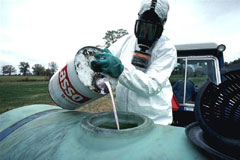Basel, Rotterdam and Stockholm conventions to hold ‘sustainable synergies’ meetings aimed at solidifying collaboration among the three legally autonomous global agreements.

© Toxipedia
Geneva, Switzerland, 15 April 2013 – The three conventions that govern chemicals and hazardous waste safety at the global level will, for the first time, convene jointly in an historic back-to-back meeting of the parties in Geneva from 28 April to 10 May 2013. Nearly two thousand participants from more than 160 countries will attend the two-week long meeting.
The three legally autonomous conventions will begin by convening joint meetings of the conferences of the parties to strengthen cooperation and collaboration between the conventions, with a view to enhancing the effectiveness of their activities on the ground. Each convention will then continue individually to deal with its own specific topics over the two-week period.
The meetings will culminate in a ministerial segment on 9 and 10 May 2013 dedicated to the theme of strengthening synergies between the conventions at national, regional and global level. The ministerial segment will be opened with scheduled remarks by Swiss Federal Councillor Doris Leuthard, UN Under-Secretary General and UN Environment Programme (UNEP) Executive Director Achim Steiner, Food and Agriculture Organization of the United Nations (FAO) Director-General José Graziano da Silva, and Global Environment Facility (GEF) CEO and Chairperson Naoko Ishii. Over 80 Ministers and Deputy Ministers are scheduled to attend.
The joint meetings of the conferences of the parties to the Basel, Rotterdam and Stockholm conventions, opening on 28 April 2013, will review of the impact of the arrangements put in place by governments in 2011 to strengthen synergies among the treaties. The parties will also consider whether to make further modifications to the organization of the Secretariat, the programme of work and budget for joint activities of three conventions in 2014-2015, and a proposal for financing chemicals and waste related activities. There will also be joint discussions related to compliance, technical assistance and financing, reporting and POPs-containing waste.
The sixth meeting of the Conference of the Parties to the Stockholm Convention will consider the possible addition of hexabromocyclododecane (HBCD) to Annex A to the Convention with specific exemptions for expanded polystyrene and extruded polystyrene in buildings. It also will work to adopt a non-compliance mechanism.
The sixth meeting of the Conference of the Parties to the Rotterdam Convention will consider the possible addition of five chemicals and one severely hazardous pesticide formulation to Annex III of the Convention1. The conference will also work to adopt a non-compliance mechanism.
The eleventh meeting of the Conference of the Parties to the Basel Convention will follow-up to the Indonesian-Swiss country-led initiative (CLI) on how to improve the effectiveness of the Convention and consider the possible adoption of a framework for the environmentally sound management of hazardous wastes and other wastes, as well as the possible adoption of technical guidelines on transboundary movements of electronic and electrical wastes (e-waste).
For more information, see also the 2013 COPs website: synergies.pops.int.
Follow the Basel, Rotterdam and Stockholm Conventions on Twitter @brsmeas.
Note to editors:
Chemicals contribute many advantages to today's world; however their use can also pose risks to human health and the environment. To reduce this harmful global impact, three conventions have been established that regulate chemicals and hazardous waste at global level:
Basel Convention on the Control of Transboundary Movements of Hazardous Wastes and their Disposal regulates the export/import of hazardous waste and waste containing hazardous chemicals. The Convention was adopted in 1989 and entered into force in 1992. It currently has 180 Parties.
Rotterdam Convention on the Prior Informed Consent Procedure for Certain Hazardous Chemicals and Pesticides in International Trade currently regulates information about the export/import of 43 hazardous chemicals listed in the Convention’s Annex III, 32 of which are pesticides (including 4 severely hazardous pesticide formulations) and 11 of which are industrial chemicals. The Convention was adopted in 1998 and entered into force in 2004. It currently has 152 Parties.
Stockholm Convention on Persistent Organic Pollutants currently regulates 22 toxic substances that are persistent, travel long distances, bioaccumulate in organisms and are toxic. The Convention was adopted in 2001 and entered into force in 2004. It currently has 179 Parties.
For media inquiries, contact:
Mr. Michael S. Jones, Public Information Officer, Secretariat of the Basel, Rotterdam and Stockholm Conventions, United Nations Environment Programme (UNEP), Mobile +41 (0) 79 730 44 95, msjones@pic.int, SkypeID: mstanleyjones
For information on the ministerial segment, contact:
Ms. Laura Meszaros, Programme Officer, Secretariat of the Basel, Rotterdam and Stockholm Conventions, United Nations Environment Programme (UNEP), Tel. +41 (22) 917 87 40, lmeszaros@pic.int
Download this press release in French
The five chemicals and the formulation proposed for listing are: Azinphos-methyl; PentaBDE: Pentabromodiphenyl ether (CAS No. 32534-81-9) and pentabromodiphenyl ether commercial mixtures; OctaBDE: Octabromodiphenyl ether commercial mixtures; PFOS: Perfluorooctane sulfonic acid, perfluorooctanesulfonates, perfluorooctanesulfonamides and perfluorooctanesulfonyls; Chrysotile asbestos; and Paraquat: Liquid formulations (emulsifiable concentrate and soluble concentrate) containing paraquat dichloride at or above 276 g/L,corresponding to paraquat ion at or above 200 g/L.